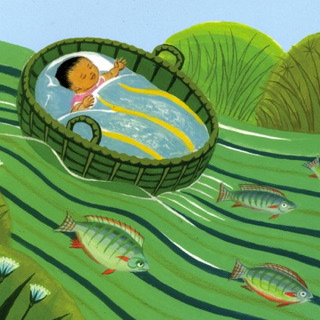After a fabulous podcast last night where we talked about immersing ourselves in Scripture stories as a way to pray -- yes, even the Tower of Babel holds such possibilities! -- I got to thinking about other images from Scripture and beyond that can help us "capture" or articulate or explore where we are with God right now on our faith journey.
 I recently read some scripture commentaries on the story in Exodus about baby Moses being placed in a homemade boat and sent down the Nile River.
I recently read some scripture commentaries on the story in Exodus about baby Moses being placed in a homemade boat and sent down the Nile River.
As intellectually awesome as those were, it was a comment on a Carmelite blog that really helped me dive into this story as not just an inspiring scripture story but as a the Living Word of God.
The blog post came from Chris Sedlmeyer's blog Climbing Carmel, in which he writes about discerning his call to become a Carmelite. Responding to a blog comment in which "Eddie" talks about his own discernment journey as being "a boat that relies solely on the wind as it navigates in the ocean," Chris responded:
You are in good company when you bring up the “rudderless boat” image–it is a very ancient spiritual symbol of perfect faith that finds its way into every spiritual tradition. The most notable instance in our own Catholic heritage is none other than the infant Moses set adrift and found by the handmaiden of the Pharaoh. This is the symbol in its most expressive form, not only is the “boat” without rudder or sail, but it is barely sea-worthy and the occupant (a baby no less) is truly helpless on the tides! It is a beautiful image of our dependence on God’s providence, which is the heart of the spiritual life. Jesus Himself (the perfect contemplative in action) makes a point to say that it is not His will He does, but the will of the one who sent Him.
To put this in the context of the image, God is the sea we drift on and grace is the wind the pushes the current and our boat to its shore–so looking with spiritual eyes we are never alone or lost as we toss about without sail or rudder, we are merely allowing God to take us where we would never think to go ourselves.
The quintessential parallel of the motif in medieval literature (my background) is in the Tale of Tristan and Isolte and Chaucer’s Man of Law’s Tale.
I love how Chris developed this. It gives me much food for thought and for reflecting on how and why this image of the rudderless boat rings true for me at this time in my life. It makes me so grateful for the lovingly made papyrus basket daubed with biumen and pitch in which I sit afloat a stream whose current will carry me God knows where.
How does the rudderless boat image speak to you? What other image springs to mind as you think about your own journey of faith right now?
Image Credit: Illustration from the book The Moses Basket by Jenny Koralek and Pauline Baynes
Recent Comments
(No subject)
I love your image of the little child holding a parent's hand and the 1 John verse!
As a country that is obsessively goal oriented I tend to try to control everything about my life and as far as i can see things rarely go as planned. This leads to worrying and frustration and a bunch of time wasted working on plan 2. The older and wiser I get the more I see I'm not really in control of anything, let alone everything. The times I have remembered to "turn it over to God", have been the times when life became easier and happier and I knew everything was going to be all right. These have also been the times when I have been most aware of the real presence of God.
An image that occurs to me is a little child holding a parent's hand and following along, probably not sure of where they were going, but confident that as long as this beloved hand was holding theirs, it didn't matter.
1 John 3:2 says: "Beloved, we are God's children now; what we shall be has not yet been revealed."